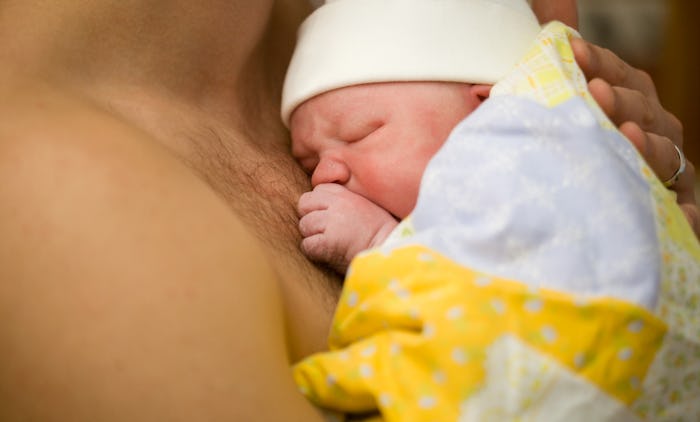Life

Here's Why Even Dads Should Soak Up Some Skin-To-Skin Time With Their Newborn
As I’m sure you’ve seen, there is an adorable photo of Dwayne “The Rock” Johnson “skin-to-skin” with his brand new baby girl, causing exploding ovaries everywhere. Most women know the benefits of skin-to-skin right after childbirth and all the amazing benefits to both her baby, but what about dads? Should dads do skin-to-skin like The Rock did? What are the benefits for both dad and baby, and are they similar to the benefits moms provide and receive?
According to the American Academy of Pediatrics (APA), skin-to-skin contact is linked to happier and healthier newborns. Why is that? APA noted it stabilizes the baby’s heart rate and breathing patterns, decreases crying (yay), and gives you a higher success rate when it comes to breastfeeding. Additionally, Dr. Idries Abdur-Rahman, an OB-GYN and medical travel blogger for TwinDoctorsTV, says in an email interview with Romper that skin-to-skin helps baby maintain their core body temperatures, form stronger parental bonds, improves the baby’s immune system, and improves sleep by “stimulating deeper, longer sleep — something any new parent knows is a huge benefit.”
And other than the breastfeeding aspect, all of these positives to skin-to-skin occur whether it’s skin-to-skin time with mom or dad. “Dads absolutely should do skin-to-skin for all of the reasons that we just discussed. Skin-to-skin strengthens baby’s immune system, helps to calm baby, and stimulate better sleep and create stronger bonds,” Abdur-Rahman says.
How does skin-to-skin work exactly, and how do all of these amazing benefits happen for you and baby just by laying them on your skin? As far as the core body temperature regulation, Abdur-Rahman says, “Babies are born naked and wet and keeping their skin against mom's or dad’s warm skin helps to prevent hypothermia. This is most important immediately after birth.” And the bonding that happens? Well, that’s thanks to the stimulation and release of hormones and pheromones “that last well after the newborn period,” Abdur-Rahman explains. Skin-to-skin strengthens the baby’s immune system by exposing mom and dad’s antibodies through the skin. “When babies are born, the only antibodies they have are the antibodies that crossed the placenta from mom during pregnancy. Unfortunately, these antibodies are temporary and baby has to make his or her antibodies the hard way, through exposure to germs and infections.” Another way to provide these important antibodies are through breastfeeding.
The APA noted yet another benefit for skin-to-skin contact — effective pain relief. Whether it’s with dad or mom, “skin-to-skin contact decreased injection pain and duration.” The study conducted used oral dextrose treatment in addition to the skin-to-skin contact when the babies were receiving their hepatitis B vaccine. “The combination of oral 25% dextrose treatment and skin-to-skin contact acted synergistically to decrease acute pain in healthy neonates,” the study noted.
As we all know, birth plans don’t always go 100 percent. If for some reason you cannot do skin-to-skin with your baby after birth — whether because of complications or a C-section — it’s OK. Abdur-Rahman says it’s not the end of the world. “While skin-to-skin contact has some obvious benefits, babies have survived for centuries without formal skin-to-skin bonding. All of the benefits of skin-to-skin can be obtained in other ways (incubators and swaddling can keep babies warm, breast-feeding does wonders to improve a baby’s immune system, just holding and communicating with your baby stimulates bonding and swaddling and music can stimulate relaxation and better sleep).”
Skin-to-skin has some amazing benefits for everyone involved, including dads. Dads should do skin-to-skin if possible, even though it may be tough for mom to share the love. The bonding that occurs between parent and baby are unbeatable. And if for any reason you can’t do skin-to-skin after your baby is born, if your partner is there, ask your birthing team if dad can do skin-to-skin for a bit until you’re ready. Otherwise, incubators, swaddling, and breastfeeding are great ways to bond and provide antibodies to your baby, too.
Check out Romper's new video series, Bearing The Motherload, where disagreeing parents from different sides of an issue sit down with a mediator and talk about how to support (and not judge) each other’s parenting perspectives. New episodes air Mondays on Facebook.